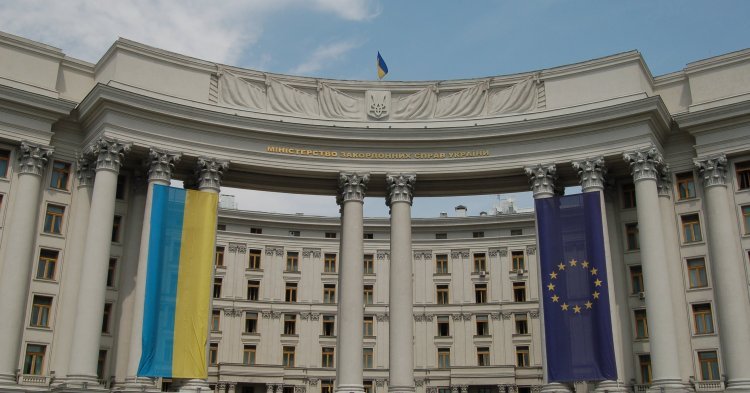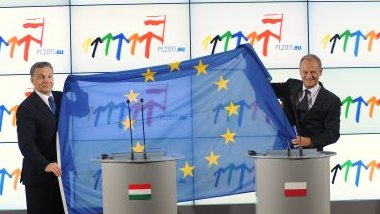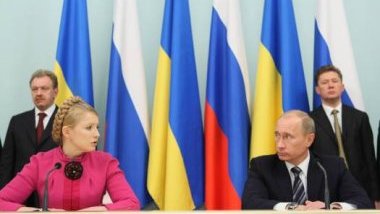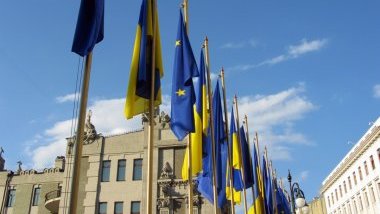In October the Dutch Electoral Council confirmed that the citizens’ initiative to organise a referendum on the European Union’s 2014 Association Agreement (AA) with Ukraine had gathered over 400,000 signatures. This means that next April a non-binding referendum will be held on whether the Dutch government should ratify the agreement with Ukraine.
The petition was organised by GeenPeil, a cooperation between GeenStijl, the Burgercomité EU (Citizens’ Committee EU) and the Forum voor Democratie. The first is an online media platform of the populist-right, the second is an organisation committed to the Netherlands leaving the EU and the last is a think tank whose most prominent member, Thierry Baudet, labelled the EU a “foreign occupying force”. Baudet, together with the public face of GeenPeil, Jan Roos, a GeenStijl journalist known for his confrontational style, belong to a generation now exiting their thirties associated with the anti-establishment politics which emerged as a reaction to the ‘Third Way’ of the 1990s.
Their campaign, typical for this ideological current, was based on a subtle mix of regular Euroscepticism and the propaganda of the Putin government. While they do not deny the most important facts - that the rebels in Ukraine are supported by Putin, that the conflict concerns resources and the reestablishment of Russia’s imperial sphere - they have also incorporated central themes of Putin’s propaganda narrative: that this AA is a first step to membership, that Ukrainian EU-membership would compromise Russian sovereignty, that the negotiations (and not political pressure of the Putin government) led to the Euromaidan movement and that the Ukrainian government has neo-Nazi tendencies.
One should not, however, make the mistake of thinking that GeenPeil organised this referendum out of great concern with the strengthening of European ties with Ukraine at a moment when Ukraine’s relations with Russia are becoming increasingly hostile. The proposal for a referendum on the AA with Ukraine was never actually a deliberate move, rather being the product of timing and circumstance as the first major issue on the table since the Consultative Referendum Law entered into force in the Netherlands. Furthermore, they do not even think the referendum will have the effect of blocking the treaty, claiming “Brussels will never allow this to happen”. The referendum is thus not so much an attempt to block the treaty as one to “stimulate the dormant discussion about democracy itself, and improve the debate in general” in their own words.
That is why, somewhat surprisingly, the organisers of the petition, GeenPeil, have decided not to organise a campaign to vote against the agreement, but will only campaign for people to vote in the first place. Jan Roos, the face of GeenPeil, even claimed to be in favour of the AA and reportedly plans to vote accordingly.
The Federalist Predicament
Herein lies the dilemma for us at JEF Netherlands. On the one hand, we are glad that citizens are democratically engaged with Europe and want them to be more engaged. In this sense, the opportunity to debate a cornerstone of the EU’s foreign policy, Association Agreements, can be considered a plus although the appropriateness of a referendum as a means to achieve these ends is debatable. On the other hand, the ideological motivations of those organisations promoting this referendum are worrying. The propagation of Putin’s narrative is still frowned upon in the Dutch public sphere, especially after the MH017 crash. However, the incorporation of elements of Putin’s narrative by GeenPeil risks normalising propaganda. Thus it is the exact opposite of an open, critical and reflexive debate that is essential for the public to make an informed decision in the referendum.
Given this predicament, we at JEF Netherlands are of the opinion that regardless of the events that led to the referendum, we must now seize the chance to start a discussion on European policy. Ukraine is part of Europe. This is a truth none of us will deny. Moreover, we, the board members, would personally support the deal with Ukraine. Nevertheless, it is important to recognise that AAs, a type of treaty which the EU has with countries all over the world, are by no means neutral. They contain a raft of politically contestable measures (e.g extensive economic liberalisation) and can have significant geo-political consequences (as is evidently the case in Ukraine). This does not mean that they are illegitimate or undesirable, but it makes it understandable that the Ukraine AA was the subject chosen for the referendum. As such, it is entirely appropriate in enhancing democracy in the EU to subject its policies to ‘deep and comprehensive’ scrutiny and the referendum is just one means to achieve this.
What is important in ensuring the opportunity offered by the referendum is seized is to stay alert to xenophobic anti-European or anti-Ukrainian sentiments creeping into the debate, a development that would risk the integrity of the democratic process. The nationalist PVV has already announced that they will encourage voters to vote against the agreement. It remains to be seen what the contents of their campaign will be. Geert Wilders, leader of the PVV, has, however, already been moving closer to Putin, attending conferences together with United Russia politicians and closely cooperating with Marine Le Pen, who is openly pro-Putin and financed by them. The risk of the referendum debate being subverted by populist and propagandist voices is thus very much real. While, of course, no voices should be silenced within the debate, we call for the opportunity to be seized for a clear-minded and honest debate on the Dutch relationship with the EU, the place of Association Agreements in EU foreign policy and the position of Ukraine with this. We at JEF Netherlands are ready to play an active part in this process and look forward to doing so in the coming months.




Follow the comments: |
|
